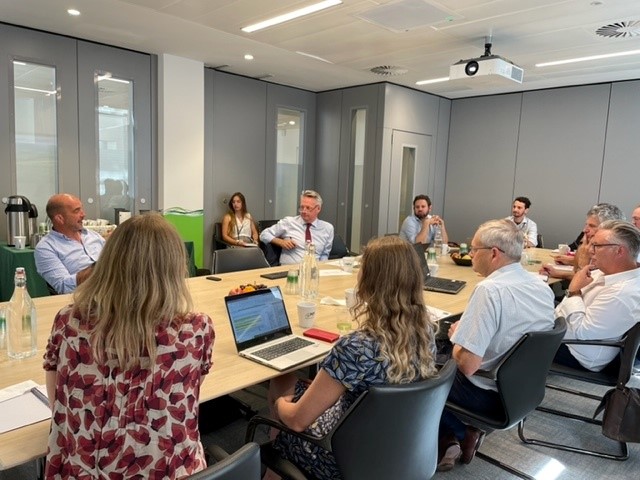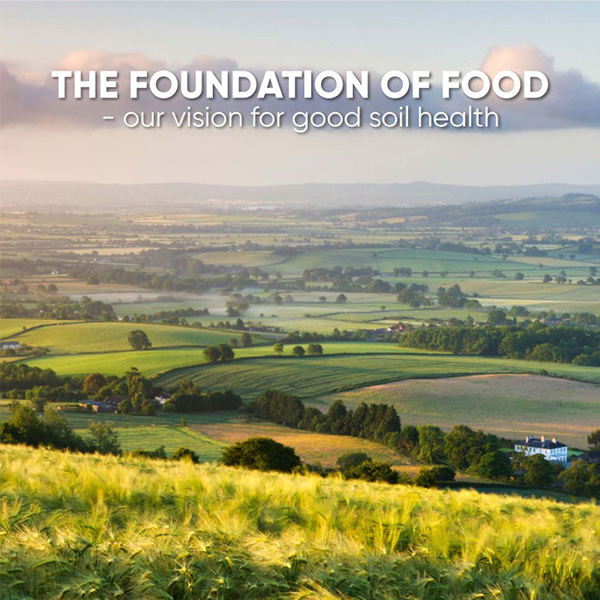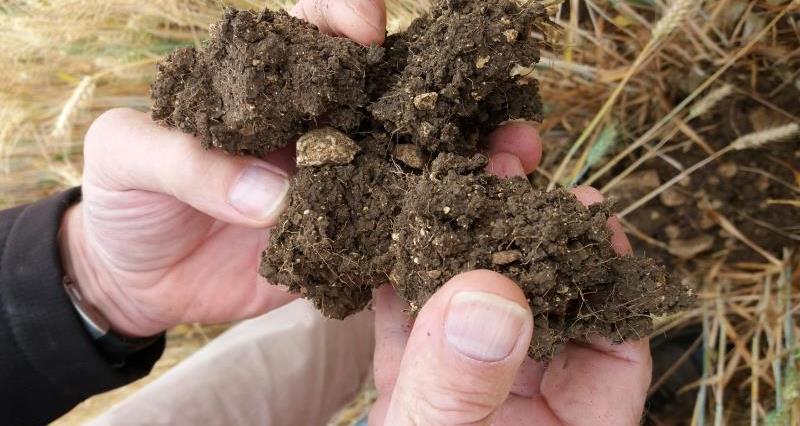Investing in the health of the nation’s soil is a key cornerstone to help the UK ensure the future of sustainable food production, meet its ambitious net zero commitments and deliver for the environment.
The Foundation of Food report, which we launched with a roundtable meeting for stakeholders on 14 July 2022, highlights why good soil health is crucial to the nation’s farming systems and essential to British food production. It explains the benefits that healthy soil delivers for:
- reducing flood risk
- supporting wildlife habitats and biodiversity
- sequestration and storage of carbon.
In the report, we welcome the focus on soil health in Defra’s first ELM (Environmental Land Management) scheme, the SFI (Sustainable Farming Incentive). This aligns with our report’s findings on the incentives that are needed to maintain and conserve soil structure.
We're also calling for grant schemes that will encourage uptake of technology to boost productivity through reduced soil compaction and erosion.
Speaking at the launch, NFU Vice President David Exwood said: “Farmers are in the best position to continue work to support soil health and ensure it for the future. The importance of healthy soils to everyone cannot be underestimated. It underpins our productive farming systems, and delivers huge benefits for the environment, the farmed landscape and offers resilience to climate change.
“Farmers are already doing fantastic work in protecting and managing their soil but with the current fragility of our global food security, it has thrown food production into sharp focus. We need to look carefully at how we protect our number one asset – our soil. Our report sets out our vision for a long-term, coordinated approach, which incentivises farmers for improving their soil and accounts for the needs of individual farm businesses.
“The new ELM programme being rolled out includes soil. It now needs to evolve and address areas like nutrient management. It’s also vital new payment schemes fairly reward farmers for these public goods and enable them to enhance this vital work.
“By working together to better preserve and enhance this most valuable national resource, we can make progress towards our goal of net zero by 2040, continue delivering for the environment, and allow our farmers to produce sustainable climate-friendly food well into the future.”
Roundtable discussions
The roundtable brought together government officials, policy-makers, scientists and NFU members to discuss why soil health is crucial to the nation’s farming systems and to suggest potential solutions to improve the way we manage our soils.
Key outcomes
- Getting the basics right is key for any positive change in management to be achieved
- Good soil metrics will build and enable understanding
- Knowledge exchange – farmers learning from farmers and farm clusters could have more of a role to play in reaching all farmers
- Improved understanding within the supply chain of food system pressures on soils
- Supportive policy mechanisms at farm level provide opportunity to bring about positive change

Long-term vision
The discussion highlighted the importance of soil and how the report gives soil the much-needed recognition it deserves; with 70% of the UK landscape being farmed, soil health is important for providing food, energy and fibre, plus environmental benefits and ecosystem services.
It is equally important to understand that soils have not always been managed well and engagement in good soil management is crucial for the success of any farming system.
The long-term vision for soil health involves every farmer in the country valuing their soil, understanding it and having a clear soil management plan.
We do not have enough land in this country to have areas set-aside for food production and other areas for environmental benefit; we must achieve both from the same piece of land.
Enabling soil to produce food, promote clean water, clean air, sequester carbon and provide good drainage are essential to the sustainability of agriculture and the environment.
Defining the issues
The definition of soil health depends on what the soil is needed for. It was accepted that baselines need to be established of where we are now and where we could potentially be.
Tenant farmers are keen to engage in improving soil recognising its importance for productivity,. It was appreciated that long-term investment is more difficult for tenants, as well as the need for landlord/tenant agreements to make soil the focus.
Climate change brings increasingly disruptive weather events and more and more often farmers need to take quick decisions for the benefit of the soil which may conflict with a 3-5 year environment scheme.
Supply chain can also make contractual demands, such as early supply of produce, which can adversely affect soil health
Establishing the basics
Getting the basics of soil right is key to achieve a positive change in management. A simple set of metrics should be established to build and enable understanding of what soil can and cannot do.
Knowledge exchange is needed to spread the available guidance and toolkits widely through the farming community, with farmers learning from each other and through forming farmer-led clusters. CFE also has a role to play.
Our vision for the future
The agricultural sector is coming together to improve soil management practice but time is not on our side. The NFU vision for the future sees a coordinated industry approach covering the complex and varied nature of the soils ecosystem.
Our vision for the future will allow agriculture to anticipate and plan for the impacts on food, fibre and fuel production, driving clear policy through a broad lens which accounts for the needs of farm businesses.
Our soils are sequestering carbon from the atmosphere and building soil organic matter. The abundant biodiversity enables farmers and growers to optimise fertiliser use while improving productivity.
Below, we outline some of the things we need to see.
Flexible policy for positive outcomes
- Public money for public goods will sit alongside private finance for additional positive outcomes on the same land.
- Future policy on soil management will be flexible and not oversimplified.
- ELMs will pay for mitigation.
- Lowland peatlands are valued as an important store of carbon, but these are also areas that are critical to producing food and hence our national food security.
Making informed decisions with reliable data
- Data collection will be more reliable and robust to help farmers and growers make informed management decisions for their businesses. Data will be comparable and meaningful when used for national benchmarking across the nation’s diverse soil types.
- Following a free nationwide soil-testing programme, farmers and growers will be carrying out more data collection and building this into their business systems. Clearer, more easily understood soil health metrics are the starting point in measuring soil performance.
- With accessible and affordable testing methods, a true picture of the multiple soil types across farms and within fields can be seen. Increased soil testing will become a business-as-usual activity as on-farm testing makes it more accessible and economic.
- Farmers and growers will be rewarded for the good management practices already undertaken to encourage continual improvements.
Share knowledge
- We will see better knowledge exchange with and between farmers and growers on soil health and greater collaboration so that all farmers and growers will be able to participate in the new markets alongside ELMs.
- Government will continue to support through the AHDB and essential industry-led initiatives like CFE (Championing the Farmed Environment), the VI (Tried and Tested and the Voluntary Initiative), and projects like CSF (Catchment Sensitive Farming).
- These continue to play an important role in providing farmers and growers with the knowledge and skills they need to manage their soil better and ensuring best practice is shared.
- The tailored and holistic approach will encourage soil health in all sectors and in all areas of the country while maintaining high levels of food security. Opportunities for sustainable food production will increase in tandem with broader environmental benefits.
Our 7 key asks of government
1. Investment in research and innovation
There is still much to learn about how soil contributes to productivity, biodiversity and climate change.
We need to assess the impact of soil management practices on physical, chemical and biological soil health. Research then needs to filter through to farm level in a practical and accessible way.
Support for a network of demonstration farms is needed to deliver proof of concept of new technologies.
We're supporting field-scale research and trials on new soil amendments for landspreading (biochar, enhanced weathering minerals), which can capture carbon. Their long-term interaction with soil ecology needs to be evaluated before their possible inclusion in soil management policy.
The four UK Agri-Tech Centres, alongside publicly funded research organisations and institutes, are working with farmers and businesses across the agrifood value chain to support greater efficiency, resilience and profitability. While each organisation has its own unique focus, our soils are ubiquitous to all farming sectors and systems.
NFU Vice President David Exwood (@DavidatWestons) talks about the ways he is working to increase SOM (soil organic matter) and the water holding capacity of the silt-clay soil on his mixed farm in West Sussex 👉 https://t.co/ZbGlU6c3Nn #BackBritishFarming 🇬🇧👨🌾 pic.twitter.com/PzjBWdI9hI
— National Farmers' Union (@NFUtweets) July 13, 2022
Cross-centre collaboration on soils research, innovation priorities and solutions could be a powerful and resourceful contribution to the industry continuing to improve the way we manage our soils.
2. Data collection and processing
Reliable and accessible MRV (measurement, reporting and verification) methods are needed to benchmark the current situation against future progress, and enable farmers and growers to make informed management decisions.
Currently the cost of MRV can be prohibitive.
A free nationwide comprehensive soil-testing programme, similar to that seen in Northern Ireland, would accelerate uptake and encourage farmers and growers to incorporate testing in business-as-usual management, more frequently than the statutory five years. For grassland farmers, soil testing is relatively new so additional support is needed to interpret reports and advise on implementation.
More needs to be made of new technologies like drones, satellite imagery and DNA sequencing to aid data collection. Soil testing should be affordable and accessible to give a true picture of the high variance of soil types both across a farm but also within individual fields.
3. Facilitating the voluntary carbon offset
The developing market in voluntary carbon offsets presents both opportunities and long-term implications for agriculture. Farmers and growers need to have confidence that the rules and standards of the market are fair and accessible.
The ELMs scheme and other government incentives must work alongside private finance to incentivise action to build further carbon stocks as well as reward maintenance to protect the existing stores.
Markets should be accessible across a range of farm sizes, tenures and business structures, and, critically, farmers and growers must be fairly rewarded for the delivery of environmental goods. High quality offsets need to be additional, verifiable and permanent, all of which present challenges for soil carbon offsetting, particularly around soil science and the ability to maintain carbon stocks over time.
For agriculture to engage in environmental markets at scale, there is a particular need to accelerate the development of a soil carbon code.
A UKFSCC (UK Farm Soil Carbon Code) is in development to set the principles and standards required for a soil carbon marketplace for farmers and growers, investors and the environment.
The development of a UK-specific soil carbon code is some way off.
All these factors need to resolve in reputable markets that work alongside the production of food, fibre and fuel. We're actively considering whether and how it can play a useful role in helping its members to engage with the emerging soil carbon offsetting market.
4. Introduce incentives
Incentives are needed to promote the urgent and widespread uptake of soil management measures which put an extra burden on a farm system.
- ELMs includes some soil health management options like soil testing of organic matter, applications of organic manures and cover cropping. It now needs to evolve and address nutrient management and reduced tillage, if appropriate to the farming system. Payment rates need to act as an incentive to participation. As custodians of the majority of the organic matter and carbon already in the soil we would like to see the conservation and maintenance of these stores properly rewarded.
- A ‘one size fits all’ approach could be detrimental to soil health in some sectors and some areas of the country. ELMs should be flexible and accessible if we are to see significant uptake at the scale needed.
- Stackable payments available in SFI (Sustainable Farming Incentive) will enable farmers and growers to take full advantage of both public and private funding opportunities. The mechanism for reward payments could be based on proxy indicators such as measuring the area under changed management likely to enhance soil carbon.
- Include soil health management options in any future productivity scheme to help with the costs of capital investment.
5. Flexibility in tenancy agreements
Tenants, who make up at least 30% of the total land area in England and Wales, are increasingly under pressure from short-term tenancies and high rental costs.
The tenanted sector underpins many existing farming businesses and provides an important route of entry for new farmers and growers.
Flexibility in tenancy agreements could promote tenants’ investment in the land, and in maintaining and managing good quality soil.
Tenancy legislation and private agreements should recognise and reward agricultural tenants for the additional benefit they add to soil quality – such as improving soil organic matter.
6. Sustainable peatlands
Sustainable peatland management has to prioritise farmers and growers, and sustainable food production.
Protecting peatlands must align with sustainable practices such as managing water levels and reducing carbon emissions.
Policies should incentivise a balance between soil protection and production, and not be overly complex to farmers.
Every peatland landscape likely is different so decisions must be made at local level to tap into the generations of expertise and knowledge of farmers and growers.
A specific lowland peat SFI standard could include reduced tillage, grass leys, cover to enhance soil carbon.
7. Knowledge exchange
We need a greater exchange of knowledge, with initiatives like CFE (Championing the Farmed Environment) and CSF (Catchment Sensitive Farming) continuing to play a key role in helping protect and improve soil health.





